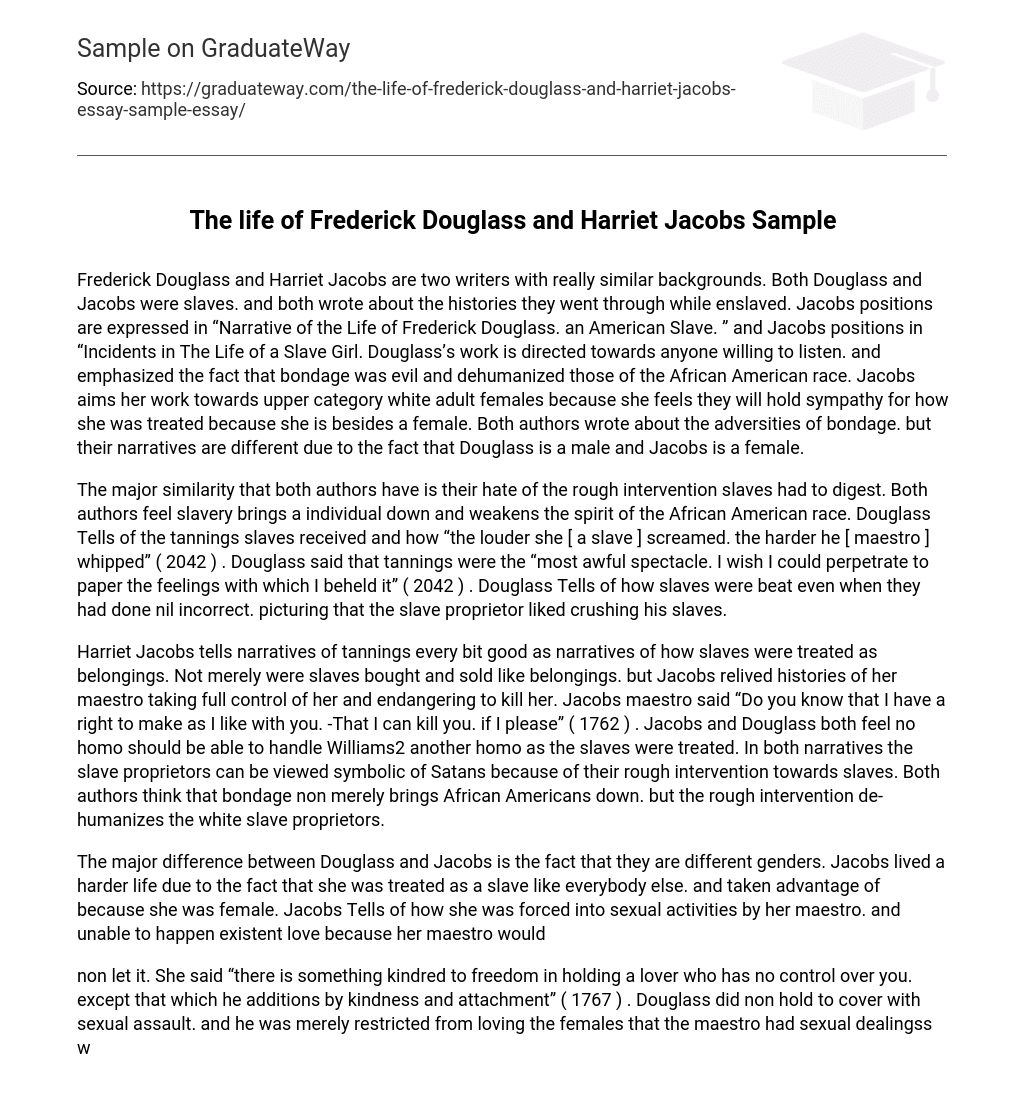Frederick Douglass and Harriet Jacobs are two writers with really similar backgrounds. Both Douglass and Jacobs were slaves. and both wrote about the histories they went through while enslaved. Jacobs positions are expressed in “Narrative of the Life of Frederick Douglass. an American Slave. ” and Jacobs positions in “Incidents in The Life of a Slave Girl. Douglass’s work is directed towards anyone willing to listen. and emphasized the fact that bondage was evil and dehumanized those of the African American race. Jacobs aims her work towards upper category white adult females because she feels they will hold sympathy for how she was treated because she is besides a female. Both authors wrote about the adversities of bondage. but their narratives are different due to the fact that Douglass is a male and Jacobs is a female.
The major similarity that both authors have is their hate of the rough intervention slaves had to digest. Both authors feel slavery brings a individual down and weakens the spirit of the African American race. Douglass Tells of the tannings slaves received and how “the louder she [ a slave ] screamed. the harder he [ maestro ] whipped” ( 2042 ) . Douglass said that tannings were the “most awful spectacle. I wish I could perpetrate to paper the feelings with which I beheld it” ( 2042 ) . Douglass Tells of how slaves were beat even when they had done nil incorrect. picturing that the slave proprietor liked crushing his slaves.
Harriet Jacobs tells narratives of tannings every bit good as narratives of how slaves were treated as belongings. Not merely were slaves bought and sold like belongings. but Jacobs relived histories of her maestro taking full control of her and endangering to kill her. Jacobs maestro said “Do you know that I have a right to make as I like with you. -That I can kill you. if I please” ( 1762 ) . Jacobs and Douglass both feel no homo should be able to handle Williams2 another homo as the slaves were treated. In both narratives the slave proprietors can be viewed symbolic of Satans because of their rough intervention towards slaves. Both authors think that bondage non merely brings African Americans down. but the rough intervention de-humanizes the white slave proprietors.
The major difference between Douglass and Jacobs is the fact that they are different genders. Jacobs lived a harder life due to the fact that she was treated as a slave like everybody else. and taken advantage of because she was female. Jacobs Tells of how she was forced into sexual activities by her maestro. and unable to happen existent love because her maestro would
non let it. She said “there is something kindred to freedom in holding a lover who has no control over you. except that which he additions by kindness and attachment” ( 1767 ) . Douglass did non hold to cover with sexual assault. and he was merely restricted from loving the females that the maestro had sexual dealingss with. Another benefit that work forces had over adult females was their natural ability to work harder. Jacobs Tells of many times when work forces were non treated every bit rough as adult females merely because they could make more work in a twenty-four hours. Harriet Jacobs and Frederick Douglass both lived a life of bondage. The lone difference between Jacobs and Douglass is Jacobs life was harder because she had to digest sexual assault and harsher intervention than work forces.
In decision one [ I ] feels it is sad that slaves were treated like they were. Slaves were non treated as people. alternatively they were treated as belongings. Both Douglass and Jacobs Tell of the awful experiences they witnessed. Both of the writers wrote their narratives to rock people off from believing in and leting bondage. Douglass attempted to rock those of all race and gender with his remembrance of the awful events that he witnessed in bondage. Jacobs tried to rock those of the white female gender because she felt they would hold understanding for her. Through their Williams 3 efforts both Douglass and Jacobs swayed many in favour of bondage to detest bondage due to the inhumane events that they recollected in both of their plants.





